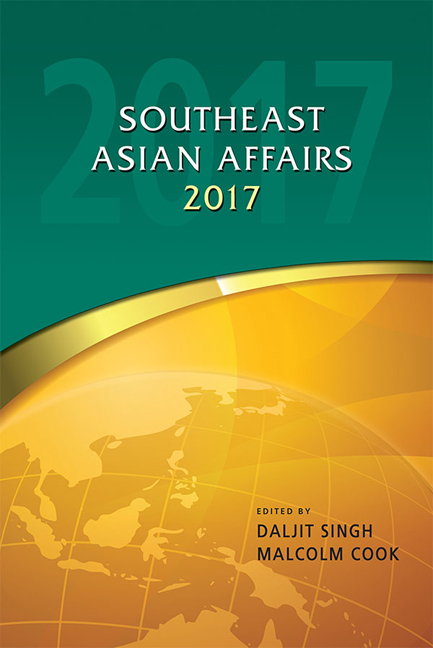Book contents
- Frontmatter
- Contents
- Foreword
- Introduction
- Acknowledgements
- THE REGION
- Southeast Asia in an Age of Strategic Uncertainty: Legal Rulings, Domestic Impulses, and the Ongoing Pursuit of Autonomy
- Southeast Asian Economies: In Search of Sustaining Growth
- Forging the ASEAN Economic Community, 2015 to 2016 — and Beyond
- Southeast Asia's Demographic Situation, Regional Variations, and National Challenges
- U.S.–Japan–Australia Strategic Cooperation in the Trump Era: Moving from Aspiration to Action
- Blurring the Distinction between Huaqiao and Huaren: China's Changing Policy towards the Chinese Overseas
- BRUNEI DARRUSALAM
- CAMBODIA
- INDONESIA
- LAOS
- MALAYSIA
- MYANMAR
- THE PHILIPPINES
- SINGAPORE
- THAILAND
- TIMOR-LESTE
- VIETNAM
Southeast Asia in an Age of Strategic Uncertainty: Legal Rulings, Domestic Impulses, and the Ongoing Pursuit of Autonomy
from THE REGION
Published online by Cambridge University Press: 12 January 2018
- Frontmatter
- Contents
- Foreword
- Introduction
- Acknowledgements
- THE REGION
- Southeast Asia in an Age of Strategic Uncertainty: Legal Rulings, Domestic Impulses, and the Ongoing Pursuit of Autonomy
- Southeast Asian Economies: In Search of Sustaining Growth
- Forging the ASEAN Economic Community, 2015 to 2016 — and Beyond
- Southeast Asia's Demographic Situation, Regional Variations, and National Challenges
- U.S.–Japan–Australia Strategic Cooperation in the Trump Era: Moving from Aspiration to Action
- Blurring the Distinction between Huaqiao and Huaren: China's Changing Policy towards the Chinese Overseas
- BRUNEI DARRUSALAM
- CAMBODIA
- INDONESIA
- LAOS
- MALAYSIA
- MYANMAR
- THE PHILIPPINES
- SINGAPORE
- THAILAND
- TIMOR-LESTE
- VIETNAM
Summary
Growing strategic uncertainty has defined much of the Southeast Asian context for the last decade. Much of this has been due to changing great power dynamics created, on the one hand, by the growing capacities and confidence of China as a rising power in Asia, and, on the other, the intensified anxieties of the United States and Japan as the region's status quo powers. Developments of 2016 were unlikely to change that basic structural condition, but it did prove to be a year of some notable developments nonetheless. Among the most anticipated was the 12 July ruling on the South China Sea by an Arbitral Tribunal housed at the Permanent Court of Arbitration in The Hague, which unanimously ruled in favour of the Philippines on almost all the fifteen points brought to the court. In a different region such a development might be more decisive, but this is Southeast Asia, where uncertainty remains a defining feature of the strategic environment, where mixed incentives associated with large states produce forces of both repulsion and attraction, and where hedging and the pursuit of autonomy remain the hallmarks of security strategies. Moreover, domestic developments in 2016 may prove to be as, if not more, defining in their implications for regional security and strategic trends.
In the face of heightened flux, three related dangers and imperatives that have long defined the Southeast Asian predicament remained outstanding in 2016: (1) how to ensure that Southeast Asian states are not made casualties of great power conflict; (2) strategies of hedging in defence of Southeast Asian autonomy; and (3) the future of the ASEAN project as a means to greater comprehensive security and in defence of Southeast Asian voice and institutional centrality.
The South China Sea Arbitration Ruling: Dramatic and Not?
After a decade of intensified tensions in the South China Sea, 2016 stands out as the year that the Arbitral Tribunal issued a devastating ruling against China's position and activities in the South China Sea. Among its most notable points, the tribunal ruled that China's nine-dash-line claim based on historic rights had no standing under UNCLOS, which China had signed and ratified and which now “superseded any historic rights, or other sovereign rights or jurisdiction” beyond those set by UNCLOS.
- Type
- Chapter
- Information
- Southeast Asian Affairs 2017 , pp. 3 - 18Publisher: ISEAS–Yusof Ishak InstitutePrint publication year: 2017

